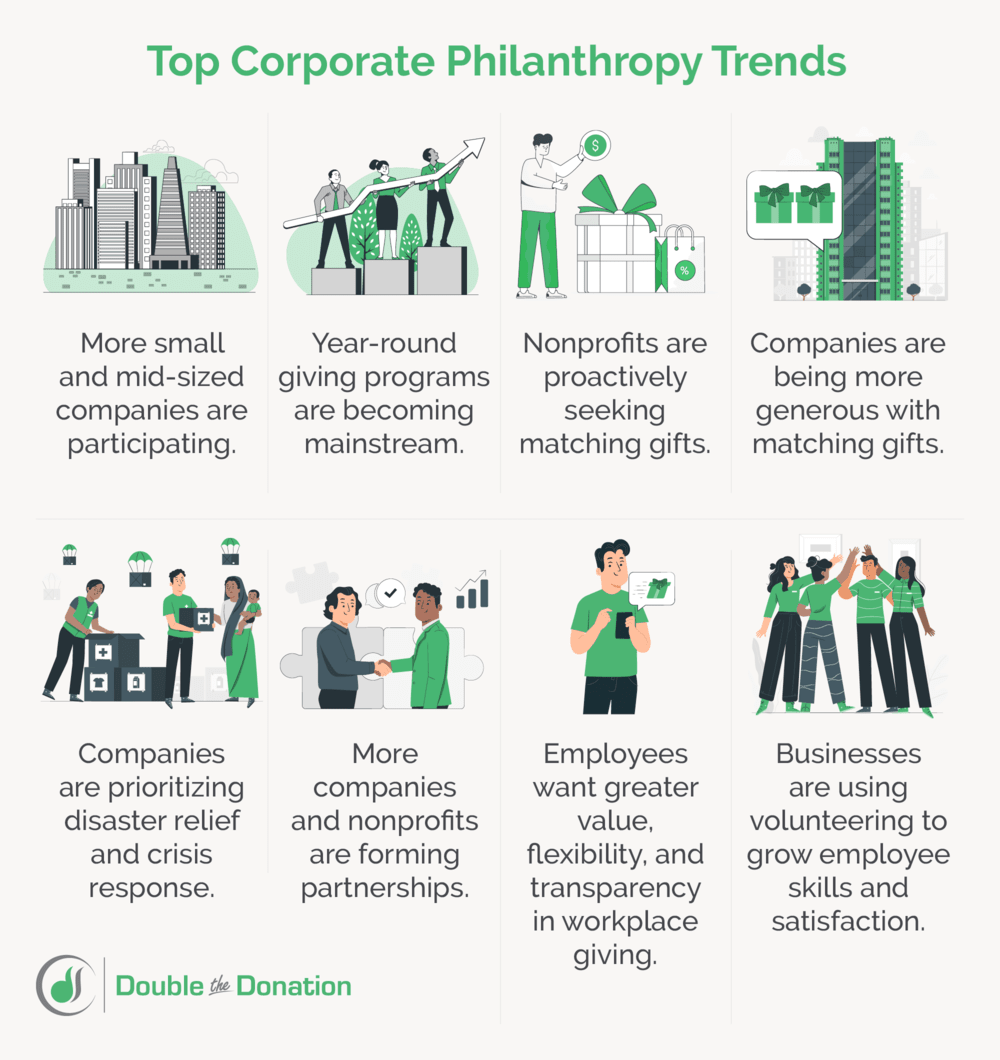How startups should embrace corporate philanthropy from day one
Wiki Article
Discovering Just How Business Philanthropy Shapes Brand Reputation and Customer Commitment
Business philanthropy significantly influences brand name track record and client commitment. Business that participate in authentic philanthropic efforts frequently see a favorable shift in how customers view them. This alignment of worths promotes trust and psychological connections with target markets. Nevertheless, the effectiveness of these kind efforts can differ considerably. Recognizing what genuinely resonates with consumers is important for brand names seeking to boost their social impact and market placement. What strategies will arise as important for future success?The Advancement of Business Philanthropy
As businesses progressively identify their function in culture, the development of company philanthropy has actually transformed from simple philanthropic donations to a calculated component of brand name identification. Business involved in philanthropy mainly for tax obligation benefits or to boost their public photo. Over time, this method changed as stakeholders-- consisting of employees, customers, and investors-- required a more authentic commitment to social responsibility.Organizations began aligning their philanthropic initiatives with their core values and organization goals, causing even more thoughtful and impactful payments. This change has encouraged companies to buy sustainable practices and community growth, cultivating a feeling of objective that reverberates with consumers.
Technological advancements have actually assisted in transparency and engagement, permitting organizations to display their humanitarian efforts extra successfully. Business philanthropy has arised as an important part of organization method, with organizations welcoming the opportunity to favorably affect society while boosting their overall brand name narrative.
The Effect of Philanthropy on Brand Understanding
While companies participate in philanthropic initiatives to promote social great, these campaigns considerably shape brand assumption among customers. Corporate philanthropy can improve a brand name's image by linking it with positive social effect and area involvement. Consumers often view brand names that actively join philanthropic activities as more trustworthy and accountable. This assumption can influence getting choices, as consumers may favor brands that demonstrate a dedication to social problems.
Building Emotional Connections With Offering
Company philanthropy functions as an effective tool for enhancing brand identity by linking business values with neighborhood requirements. With calculated offering, firms can cultivate area involvement and develop common worths that reverberate with customers on a psychological degree. This technique not just enhances brand name track record yet likewise develops enduring connections between companies and their stakeholders.Enhancing Brand Identity
They not only add to social great however also build much deeper emotional connections with their target markets when business engage in philanthropic initiatives. By straightening their brand with charitable reasons, firms enhance their identification and signal values that resonate with customers. This positioning produces a narrative that surpasses solutions and items, inviting consumers to take part in a shared goal. As consumers increasingly focus on purpose-driven brand names, companies that proactively involve in giving can separate themselves in a congested market. Such initiatives cultivate a sense of loyalty among consumers that feel directly connected to the brand's values. Ultimately, company philanthropy ends up being an important tool for improving brand identity, cultivating long lasting connections based upon common ideas and psychological interaction.Fostering Community Engagement
Many researches suggest that firms involving in community-focused humanitarian efforts can noticeably reinforce psychological connections with their stakeholders. By investing in neighborhood projects and supporting social causes, businesses cultivate a feeling of belonging and trust within the neighborhood. This involvement fosters a positive brand name photo, as customers appreciate firms that show genuine issue for social concerns. Additionally, workers often feel a lot more determined and proud to be connected with a company that focuses on area welfare. As an outcome, customers are extra most likely to develop loyalty towards brands that actively add to meaningful reasons. Ultimately, fostering community engagement through philanthropy not only enhances brand credibility however likewise develops enduring emotional ties that benefit both the company and the community it serves.Producing Shared Worths
Exactly how can businesses properly produce shared values that resonate with their stakeholders? Firms can accomplish this by aligning their philanthropic initiatives with their core goal and the rate of interests of their areas. By involving in efforts that deal with local demands, organizations promote emotional links with customers, enhancing brand name commitment. Partnering with non-profits that mirror shared values strengthens the brand name's image and shows commitment to social responsibility. Furthermore, transparent interaction regarding these efforts enables stakeholders to see the tangible effect of their contributions. Inevitably, by integrating common values right into their business philanthropy, firms not only boost their online reputations however additionally cultivate long-term connections with customers, leading to increased loyalty and trust. This positioning is essential in modern-day consumer decision-making.Situation Studies: Effective Philanthropic Campaigns
Checking out successful kind campaigns discloses numerous approaches that improve brand online reputation. Impactful area efforts, innovative collaboration versions, and lasting engagement methods have actually verified effective in fostering favorable connections with customers. These instance research studies highlight the value of thoughtful business giving up accomplishing both social and business goals.Impactful Neighborhood Initiatives
Many companies have successfully leveraged kind projects to enhance their brand credibility while making a purposeful impact in their neighborhoods. For example, a modern technology firm launched a digital proficiency program in underserved communities, supplying training and resources that empowered local residents. This use this link campaign not only added to neighborhood growth but likewise positioned the company as a socially responsible leader. A major food firm executed a hunger alleviation project, partnering with local nonprofits to distribute meals to family members in demand. This effort reinforced area ties and fostered customer commitment. Through these impactful campaigns, companies have shown their dedication to social duty, successfully aligning their brand values with the demands of the areas they offer, ultimately improving their general reputation.Cutting-edge Partnership Models
The success of impactful community initiatives frequently depends upon ingenious partnership designs that bring together varied stakeholders to resolve complex social challenges. Study highlight how companies, non-profits, and federal government entities can work together efficiently. A multinational company partnered with a local non-profit to release an education program, pooling sources and proficiency to boost community literacy prices. An additional example included a technology company and a health care company signing up with forces to establish a telemedicine option for underserved populaces. These partnerships not only magnified the reach of kind efforts however likewise enhanced the brand names' credibilities by straightening their goals with area needs. Eventually, ingenious collaboration versions function as a catalyst for significant modification and foster more powerful links in between brand names and their customers.Lasting Interaction Methods

Determining the ROI of Business Social Responsibility
As firms progressively buy company social obligation (CSR) initiatives, recognizing the return on financial investment (ROI) related to these initiatives ends up being necessary. Measuring ROI in CSR is complex, commonly including both measurable and qualitative metrics. Financial returns can be examined through raised sales, improved brand commitment, and improved worker morale, which can cause higher efficiency. Additionally, business might examine cost savings connected to sustainable techniques, such as decreased waste or power consumption.Qualitatively, the effect of CSR on brand name track record can be reviewed with customer perception research studies and social media belief evaluation. Surveys can supply understandings into exactly how CSR tasks influence client commitment and trust. Moreover, benchmarking versus industry requirements can help companies determine their CSR efficiency. Ultimately, a detailed strategy to gauging ROI enables companies to make enlightened choices concerning future CSR investments, straightening strategies with both monetary efficiency and social impact
Customer Expectations and Company Duty
Significantly, customers expect firms to run with a solid sense of company responsibility, checking out honest methods as a requirement for brand name commitment. This change in expectation mirrors an expanding recognition of environmental and social concerns, leading customers to favor brands that straighten with their worths. Consumers are a lot more inclined to sustain companies that take part in transparent methods, show sustainability, and contribute favorably to their neighborhoods.In addition, social networks amplifies these assumptions, enabling consumers to share their experiences and opinions rapidly. Brand names that stop working to fulfill these moral criteria run the risk of reaction, while those that welcome company obligation often appreciate superior credibility and customer loyalty. As customers require responsibility, business have to incorporate company social responsibility right into their core methods, prioritizing honest behavior not simply as a marketing method, yet as a fundamental element of their operations. This placement can inevitably result in stronger brand affinity and sustained success in open markets.
Future Trends in Business Philanthropy and Brand Name Loyalty
The landscape of business philanthropy is developing, influenced by the elevated customer assumptions surrounding corporate duty. Firms are progressively incorporating social effect into their core organization approaches, not simply as an ancillary activity. Future patterns suggest a change towards openness, with brand names sharing in-depth info about their philanthropic initiatives and their straight effects on communities.Innovation is playing a vital duty, making it possible for real-time engagement between brands and consumers. Social network systems promote straight interaction, permitting consumers to voice their expectations and hold brands liable. In addition, more youthful generations, specifically Millennials and Gen Z, focus on sustainability and ethical techniques, driving businesses to embrace even more diligent strategies.
As corporate philanthropy ends up being associated with brand name identity, firms that authentically align their objectives with societal needs are likely to cultivate more powerful client loyalty. This convergence of values will ultimately form the future of business online reputation and customer connections in a progressively conscientious marketplace.
Often Asked Concerns
Just How Do Consumers Learn about a Firm's Philanthropic Initiatives?
Consumers find a business's humanitarian efforts via different channels, including social media, news release, area occasions, and word-of-mouth. These methods promote recognition, enabling individuals to engage with brands that align with their values and passions.What Duty Does Staff Member Participation Play in Company Philanthropy?
Staff member involvement in company philanthropy improves interaction, fosters a feeling of possession, and enhances group cohesion - corporate philanthropy. This involvement usually intensifies the influence of philanthropic efforts, resulting in better awareness and assistance for the company's philanthropic effortsCan Corporate Philanthropy Backfire on a Brand's Track record?
Business philanthropy can without a doubt backfire on a brand's track record if perceived as insincere or opportunistic. Negative public assumption may occur, bring about decreased trust fund and loyalty among consumers who prioritize authenticity in company actions.Are Smaller Sized Firms as Efficient in Philanthropy as Larger Firms?
Smaller companies can be just as effective in philanthropy as bigger companies, often showing dexterity and authenticity. Their local initiatives might reverberate extra deeply with neighborhoods, promoting authentic links regardless of restricted resources contrasted to their bigger equivalents.Just How Can Firms Choose the Right Causes to Assistance?
Firms can pick the best trigger by straightening their values with area needs, analyzing stakeholder interests, and examining prospective impact. This calculated method fosters credibility, improves engagement, and strengthens links with consumers and the more comprehensive area.While firms engage in humanitarian efforts to promote social great, these campaigns substantially shape brand name perception among customers. As consumers increasingly focus on purpose-driven brands, companies that proactively engage in giving can distinguish themselves in a crowded market. Lots of firms have effectively leveraged humanitarian campaigns to boost their brand track record while making a meaningful effect in their neighborhoods. Progressively, customers expect firms to run with a strong feeling of company duty, checking out ethical methods as a prerequisite for brand name loyalty. As company philanthropy ends up being identified with brand name identification, firms that authentically straighten their goals with societal needs are most likely to promote go to this site more powerful consumer loyalty.
Report this wiki page